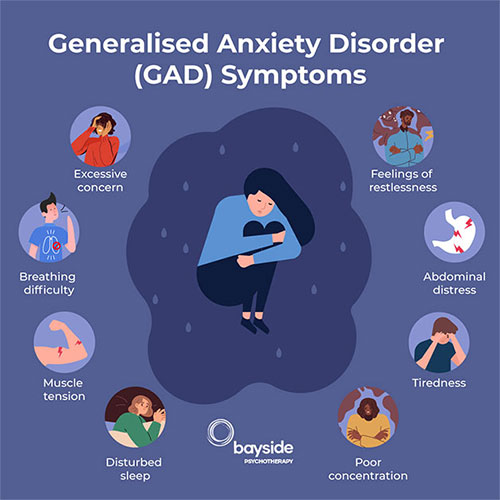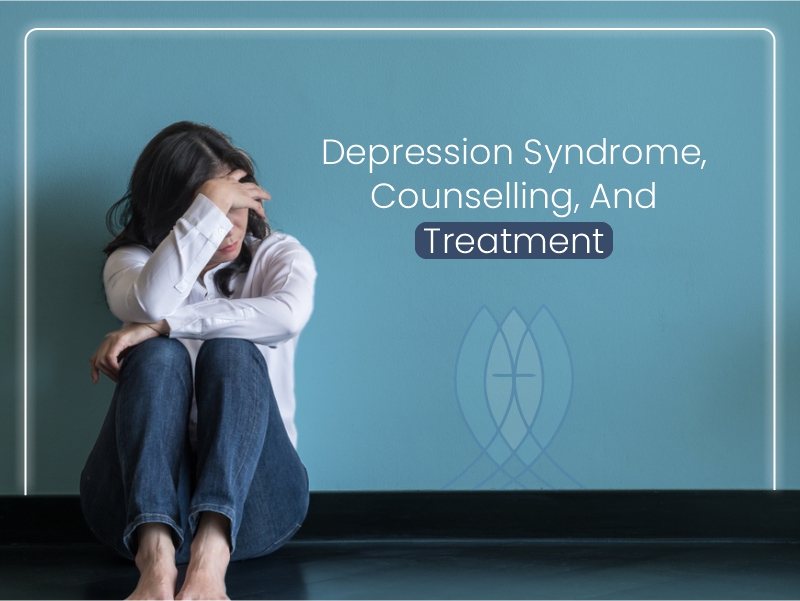Discovering Different Methods in Therapy for Anxiousness Condition for Long-term Change
When tackling anxiety problems, it's vital to check out a range of counseling strategies. Each method uses unique understandings and tools to aid you manage your signs and symptoms successfully. You may discover that incorporating strategies can produce the very best outcomes. Nevertheless, recognizing the subtleties of these strategies is key to promoting lasting change. Suppose the ideal combination could launch a new degree of psychological health for you?
Recognizing Anxiety Problems: A Short Summary
Stress and anxiety disorders, which impact countless individuals worldwide, can significantly affect life. You might experience frustrating feelings of anxiety or fret that appear unmanageable. These sensations can cause physical signs like a racing heart, sweating, and even lightheadedness. Common sorts of anxiety conditions include generalized anxiousness disorder, panic attack, and social stress and anxiety disorder. Each has one-of-a-kind indications, yet they all share a propensity to disrupt your routine and relationships.Understanding the origin of your anxiety is important. It could stem from genetics, brain chemistry, or life experiences. Identifying your triggers can help you handle your reactions better. It is necessary to bear in mind that you're not the only one in this struggle. Numerous individuals encounter comparable difficulties, and seeking assistance is a strong step towards feeling much better. By learning regarding anxiousness conditions, you're already on the path to understanding and handling your problem more efficiently.
Cognitive-Behavioral Treatment: Challenging Negative Idea Patterns
In Cognitive-Behavioral Therapy, you'll begin by recognizing the negative thought causes that add to your anxiety. As soon as you acknowledge these ideas, you'll deal with changing them with even more positive alternatives. With each other, you'll build reliable coping methods to aid manage your stress and anxiety in daily situations.
Identifying Unfavorable Idea Triggers

When you experience minutes of distress, identifying the particular triggers behind your negative thoughts can be vital in managing anxiousness. Start by taking note of scenarios that prompt sensations of worry or anxiety. Is it a congested area, a forthcoming target date, or a discussion with certain people? Write down these circumstances in a journal. This will assist you recognize patterns in your reasoning. Notification physical experiences that accompany your adverse ideas, like an auto racing heart or tightness in your upper body. By identifying these triggers, you obtain understanding into what's fueling your anxiousness. Recognizing these links is the primary step in challenging those thoughts and inevitably regaining control over your emotional feedbacks.
Changing Ideas With Positives
Testing negative thought patterns is an important step in changing your mindset and decreasing anxiety. You might commonly locate yourself trapped in cycles of self-doubt or devastating reasoning. Instead of letting these thoughts determine your sensations, method changing them with favorable affirmations or sensible alternatives. For example, when you think, "I can't manage this," change it to, "I can take care of difficulties one step at a time." This straightforward change can substantially impact your mood. Routinely determining and responding to these negative ideas helps develop a healthier inner discussion. Keep in mind, it takes time and effort, however consistently practicing this strategy can bring about enduring adjustment, encouraging you to deal with anxiety with renewed self-confidence and strength.
Building Coping Methods With Each Other
Replacing unfavorable ideas is only the beginning of taking care of stress and anxiety efficiently. To develop long-term adjustment, you require to construct coping methods that encourage you. Cognitive-Behavioral Treatment (CBT) aids you determine and challenge those purposeless idea patterns. With each other, you and your counselor can explore how these thoughts impact your sensations and behaviors.Start by creating sensible strategies, like journaling or mindfulness exercises, that allow you to confront anxiety head-on. When you face your anxieties progressively, you'll find out to react in a different way.

Mindfulness and Acceptance-Based Approaches: Growing Present-Moment Awareness
As you navigate the complexities of anxiousness, integrating mindfulness and acceptance-based strategies can significantly improve your ability to grow present-moment recognition. By concentrating on the below and now, you'll locate that you can observe your thoughts and feelings without judgment (Counseling services for anxiety). This technique helps you recognize your stress and anxiety without really feeling bewildered by it.Engaging in mindfulness exercises, such as deep breathing, body scans, or led reflections, permits you to ground yourself in your current experience. Acceptance-based methods urge you to embrace your emotions as opposed to combat against them. They lose their power over you.Incorporating these techniques into your day-to-day routine can transform just how you react to stress and anxiety when you accept your feelings. You'll develop durability and learn to navigate difficult situations with higher simplicity. Inevitably, growing present-moment understanding lays the foundation for long-term adjustment, encouraging you to lead a more satisfying life
Exposure Therapy: Confronting Fears Gradually
Exposure therapy aids you challenge your fears in a gradual method, making it much less frustrating. You'll find out strategies you could check here to encounter anxiety-provoking situations detailed, while likewise building coping methods to handle your responses. This method equips you to take control and reduce anxiousness in time.
Progressive Exposure Strategies

When facing anxiety, gradually challenging your worries can be a powerful method to restore control. This technique, known as steady exposure, includes slowly subjecting on your own to the situations or things that activate your anxiousness. Begin with much less challenging circumstances and gradually function your way approximately more difficult ones. If you're scared of public talking, you could begin by talking in front of a mirror, then advance to sharing ideas with a buddy, and ultimately resolve a tiny group. Each step assists desensitize you to the anxiety, building your self-confidence over time. Keep in mind, it's important to pace yourself and commemorate small success as you relocate via this procedure, reinforcing your capacity to take care of anxiety efficiently.
Building Coping Approaches
Structure efficient coping methods is crucial for handling anxiety, particularly as you challenge your fears progressively - Counseling services for anxiety. One effective method is direct exposure therapy, where you start by facing your worries in a controlled way. Start with much less frightening situations and slowly function your means up to more tough situations. This gradual direct exposure helps desensitize you to stress and anxiety sets off, making them less overwhelming.Incorporate leisure strategies, such as deep breathing or mindfulness, to relax your mind during exposure. Track your progression, celebrating small triumphes along the method to improve your self-confidence. Remember, it's okay to take your time; the goal isn't perfection yet steady renovation. By constructing these techniques, you'll encourage yourself to navigate anxiety and accept life more completely
Psychodynamic Treatment: Discovering Source of Stress And Anxiety
Psychodynamic therapy explores the unconscious mind, exposing the origin of your anxiousness. By examining your ideas, sensations, and past experiences, this method aids you uncover underlying conflicts and unresolved concerns that may add to your current anxiousness. You'll work with a therapist to check out childhood years experiences, connections, and emotional patterns that shape your reactions today.As you gain understanding right into these deeper layers of your mind, you'll start to identify exactly how past occasions influence your present behavior. This understanding can lead to catharsis, allowing you to process emotions you could have suppressed.Through the therapeutic partnership, you can also recognize protection systems that may have created over time, supplying a clearer course to change. Inevitably, psychodynamic treatment outfits you with the tools to resolve your anxiousness at its core, advertising long-term change in your psychological well-being.
All Natural and integrative Strategies: Incorporating Techniques for Greater Efficiency
Incorporating various healing methods can enhance your trip toward handling anxiousness better. By integrating aspects from cognitive-behavioral therapy, mindfulness practices, and holistic strategies, you can develop a customized technique that addresses your unique demands. For instance, you could utilize cognitive-behavioral methods to test unfavorable thought patterns while including mindfulness workouts to ground yourself in the present moment.Additionally, checking out alternative methods such as yoga or meditation can advertise relaxation and minimize stress and anxiety symptoms. This mix enables you to create greater self-awareness and resilience.Experimenting with these diverse methods can aid you uncover what reverberates most with you. Bear in mind, it's regarding finding a harmony that functions, instead official website of staying with a solitary approach. This integrative strategy not just provides instant relief however also cultivates lasting skills for managing stress and anxiety, empowering you to reclaim control over your life.
The Function of Support Equipments: Structure Durability Via Connection
While it might appear that handling investigate this site anxiety is a singular trip, having a strong support group can play an essential duty in your strength. Bordering yourself with understanding friends, family, or support system develops a secure space where you can openly share your experiences and sensations. You advise yourself that you're not alone in this struggle.These connections supply support and can offer functional coping strategies that have functioned for others when you connect with others. It's likewise an opportunity to gain point of view; buddies can assist you see scenarios in a different way, lowering feelings of isolation.Moreover, emotional support cultivates a sense of belonging, which can significantly ease anxiety signs. By leaning on your support group, you can construct resilience and tackle difficulties better. Keep in mind, connecting for assistance suggests strength, and it can make all the distinction in your trip towards managing anxiety.
Often Asked Concerns
What Are the Typical Signs of Anxiousness Problems?
You could experience uneasyness, fatigue, difficulty concentrating, irritability, muscle tension, and sleep disturbances. Physical symptoms can consist of rapid heartbeat, sweating, and trembling. Recognizing these indications early can assist you look for proper support and treatment.
How Much Time Does Therapy Usually Last for Stress And Anxiety Conditions?
Therapy for anxiety problems commonly lasts anywhere from a few weeks to numerous months. It actually relies on your specific demands, development, and the methods your specialist utilizes to aid you handle your anxiety effectively.
Can Medication Be Used Along With Treatment for Stress and anxiety?
Yes, medication can definitely be made use of along with therapy for anxiety. Incorporating both techniques typically enhances therapy efficiency, helping you manage signs while checking out underlying issues via counseling (Counseling services for anxiety). Constantly consult your doctor for individualized recommendations
Are There Self-Help Techniques for Handling Anxiety?
Yes, there are numerous self-help techniques for managing stress and anxiety. You can practice mindfulness, take part in regular workout, maintain a well balanced diet, establish a regular, and use deep breathing strategies to help in reducing stress and anxiety signs and symptoms successfully.
How Do I Know if I Required Professional Aid for Anxiety?
